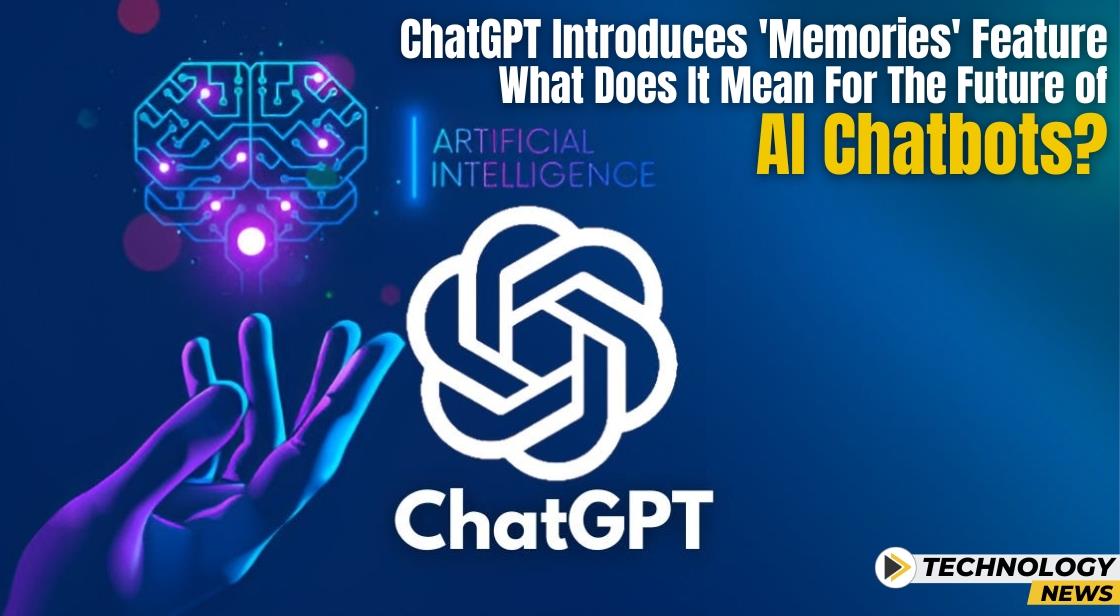ChatGPT Introduces 'Memories' Feature -What Does It Mean for the Future of AI Chatbots?

News Synopsis
In a race to outdo each other in the AI domain, Google and OpenAI are locking horns by unveiling new features for their chatbots. OpenAI's latest update brings a significant enhancement to ChatGPT, introducing the 'Memories' feature. This advancement allows ChatGPT to recall and utilize information from previous interactions, elevating the user experience.
Understanding Memories in ChatGPT:
OpenAI describes the Memories feature as a game-changer, offering users the ability to instruct ChatGPT to remember specific details, subsequently incorporating these memories into future conversations. This feature aims to eliminate the need for repetitive information and enhance the helpfulness of ChatGPT in subsequent interactions.
Users have full control over ChatGPT's memory, with the ability to explicitly instruct it to remember, inquire about its recollections, and even prompt it to forget information, either conversationally or through settings. The option to deactivate this feature entirely is also available.
How Memories Work in ChatGPT
OpenAI emphasizes that you have complete control over ChatGPT's memory. You can:
- Explicitly tell it to remember something.
- Ask it what it remembers.
- Tell it to forget information conversationally or through settings.
- Turn the feature off entirely.
Moreover, the Memories feature learns and improves over time. As OpenAI states, "ChatGPT's memory will get better the more you use it, and you'll start to notice the improvements over time."
Evolution through Self-Learning:
OpenAI emphasizes that ChatGPT's memory will improve over time through a self-learning process, leading to noticeable enhancements in its performance. The company provides illustrative examples of how memories function, such as tailoring meeting notes, leveraging knowledge about owning a coffee shop, or suggesting creative ideas based on personal preferences.
Examples of the Memories Feature in Action
OpenAI provides several concrete examples of how Memories can enhance your ChatGPT experience:
-
Meeting note preferences: Tell ChatGPT you prefer meeting notes with headlines, bullets, and action items, and it will automatically format future notes accordingly.
-
Personalized brainstorming: If you mention owning a coffee shop, ChatGPT can use this information to suggest relevant messaging for a social media post celebrating a new location.
-
Tailored content creation: Mention having a child who loves jellyfish, and ChatGPT might suggest a jellyfish-themed birthday card.
-
Adaptive lesson plans: As a teacher, you can set preferences for lesson length and activities, and ChatGPT will remember them when assisting you with planning.
Privacy and Safety Considerations:
With the introduction of memories, privacy and safety considerations come to the forefront. Users can now engage in temporary chats without invoking memory, ensuring that these conversations do not contribute to the chatbot's training data or appear in its history. Addressing privacy concerns, OpenAI emphasizes the importance of determining the type of information that should be retained and how it is utilized.
Data Controls and Enterprise Use:
OpenAI outlines that users have the option to control whether content provided to ChatGPT, including memories, can be used to enhance models for everyone. Additionally, for Enterprise and Team users, the memory feature becomes a valuable asset in professional settings, allowing ChatGPT to learn individual styles and preferences for more tailored interactions.
Rollout and Availability:
The Memories feature is set to roll out initially to a limited number of ChatGPT free and Plus users, with plans for a broader rollout in the near future. This update positions ChatGPT as a dynamic and adaptable conversational AI, marking a significant stride in AI evolution.
You May Like









